- Home
- Jr. Horatio Alger
Paul Prescott's Charge Page 5
Paul Prescott's Charge Read online
Page 5
V.
A CRISIS.
Before sunrise the next morning Paul was awakened by a rude shake fromMr. Mudge, with an intimation that he had better get up, as there wasplenty of work before him.
By the light of the lantern, for as yet it was too dark to dispense withit, Paul dressed himself. Awakened from a sound sleep, he hardly hadtime to collect his thoughts, and it was with a look of bewildermentthat he surveyed the scene about him. As Mrs. Mudge had said, they werepretty full already, and accordingly a rude pallet had been spread forhim in the attic, of which, with the exception of nocturnal marauders,he was the only occupant. Paul had not, to be sure, been used to verysuperior accommodations, and if the bed had not been quite so hard, hewould have got along very well. As it was he was separated from slatsonly by a thin straw bed which did not improve matters much. It wastherefore with a sense of weariness which slumber had not dissipated,that Paul arose at the summons of Mr. Mudge.
When he reached the kitchen, he found that gentleman waiting for him.
"Do you know how to milk?" was his first salutation.
"I never learned," said Paul.
"Then you'll have to, in double-quick time," was the reply, "for I don'trelish getting up so early, and you can take it off my hands."
The two proceeded to the barn, where Paul received his first lesson inthis important branch of education.
Mr. Mudge kept five cows. One might have thought he could have affordeda moderate supply of milk to his boarders, but all, with the exceptionof a single quart, was sold to the milkman who passed the door everymorning.
After breakfast, which was on the same economical plan with the dinnerof the day previous, Paul was set to work planting potatoes, at which hewas kept steadily employed till the dinner-hour.
Poor Paul! his back ached dreadfully, for he had never before done anyharder work than trifling services for his father. But the inexorableMr. Mudge was in sight, and however much he wished, he did not dare tolay aside his hoe even for a moment.
Twelve o'clock found him standing beside the dinner-table. He ate moreheartily than before, for his forenoon's labor made even poorhouse farepalatable.
Mrs. Mudge observed the change, and remarked in a satisfied tone. "Well,my fine gentleman, I see you are coming to your appetite. I thought youwouldn't hold out long."
Paul, who had worn off something of his diffidence, could not helpfeeling indignant at this speech; unaccustomed to be addressed in thisway, the taunt jarred upon his feelings, but he only bit his lip andpreserved silence.
Aunt Lucy, too, who had come to feel a strong interest in Paul, despiteher natural mildness, could not resist the temptation of saying withsome warmth, "what's the use of persecuting the child? He has sorrowsenough of his own without your adding to them."
Mrs. Mudge was not a little incensed at this remonstrance.
"I should like to know, ma'am, who requested you to put in your oar!"she said with arms akimbo. "Anybody wouldn't think from your lofty airsthat you lived in the poorhouse; I'll thank you to mind your ownbusiness in the future, and not meddle with what don't concern you."
Aunt Lucy was wise enough to abstain from provoking further the wrath ofher amiable landlady, and continued to eat her soup in silence. But Mrs.Mudge neer forgot this interference, nor the cause of it, and henceforthwith the malignity of a narrow-minded and spiteful woman, did what shecould to make Paul uncomfortable. Her fertile ingenuity always foundsome new taunt, or some new reproach, to assail him with. But Paul,though at first he felt indignant, learned at last to treat them as theydeserved, with silent disdain. Assured of the sympathy of those aroundhim, he did not allow his appetite to be spoiled by any remark whichMrs. Mudge might offer.
This, of course, only provoked her the more, and she strove to have hisdaily tasks increased, in the amiable hope that his "proud spirit" mightbe tamed thereby.
Mr. Mudge, who was somewhat under petticoat government, readily accededto his wife's wishes, and henceforth Paul's strength was taxed to itsutmost limit. He was required to be up with the first gray tint of dawnand attend to the cattle. From this time until night, except the brieftime devoted to his meals, he was incessantly occupied. Aunt Lucy'ssociety, his chief comfort, was thus taken from him; since, in order torise early, he was obliged to go to bed as soon as possible after day'swork was finished.
The effects of such incessant labor without a sufficient supply ofnourishing food, may easily be imagined. The dry bread and meagre soupwhich constituted the chief articles of diet in Mrs. Mudge's economicalhousehold, had but one recommendation,--they were effectual preventivesof gluttony. It was reported that on one occasion a beggar, apparentlyfamishing with hunger, not knowing the character of the house, madeapplication at the door for food. In an unusual fit of generosity, Mrs.Mudge furnished him with a slice of bread and a bowl of soup, which,however, proved so far from tempting that the beggar, hungry as he was,left them almost untouched.
One day, as Paul was working in the field at a little distance fromMr. Mudge, he became conscious of a peculiar feeling of giddiness whichcompelled him to cling to the hoe for support,--otherwise he must havefallen.
"No laziness there," exclaimed Mr. Mudge, observing Paul's cessationfrom labor, "We can't support you in idleness."
But the boy paid no regard to this admonition, and Mr. Mudge, somewhatsurprised, advanced toward him to enforce the command.
Even he was startled at the unusual paleness of Paul's face, andinquired in a less peremptory tone, "what's the matter?"
"I feel sick," gasped Paul.
Without another word, Mr. Mudge took Paul up in his arms and carried himinto the house.
"What's the matter, now?" asked his wife, meeting him at the door.
"The boy feels a little sick, but I guess he'll get over it by-andby. Haven't you got a little soup that you can give him? I reckon he'sfaint, and that'll brighten him up."
Paul evidently did not think so, for he motioned away a bowl of thedelightful mixture, though it was proffered him by the fair hands ofMrs. Mudge. The lady was somewhat surprised, and said, roughly, "Ishouldn't wonder if he was only trying to shirk."
This was too much even for Mr. Mudge; "The boy's sick," said he, "that'splain enough; if he don't get better soon, I must send for the doctor,for work drives, and I can't spare him."
"There's no more danger of his being sick than mine," said Mrs. Mudge,emphatically; "however, if you're fool enough to go for a doctor, that'snone of my business. I've heard of feigning sickness before now, toget rid of work. As to his being pale, I've been as pale as that myselfsometimes without your troubling yourself very much about me."
"'Twon't be any expense to us," alleged Mr. Mudge, in a tone ofjustification, for he felt in some awe of his wife's temper, which wasnone of the mildest when a little roused, "'Twon't be any expense to us;the town has got to pay for it, and as long as it will get him ready forwork sooner, we might as well take advantage of it."
This consideration somewhat reconciled Mrs. Mudge to the step proposed,and as Paul, instead of getting better, grew rapidly worse, Mr. Mudgethought it expedient to go immediately for the village physician.Luckily Dr. Townsend was at home, and an hour afterwards found himstanding beside the sick boy.
"I don't know but you'll think it rather foolish, our sending for you,doctor," said Mrs. Mudge, "but Mudge would have it that the boy was sickand so he went for you."
"And he did quite right," said Dr. Townsend, noticing the ghastly pallorof Paul's face. "He is a very sick boy, and if I had not been called Iwould not have answered for the consequences. How do you feel, my boy?"he inquired of Paul.
"I feel very weak, and my head swims," was the reply.
"How and when did this attack come on?" asked the doctor, turning to Mr.Mudge.
"He was taken while hoeing in the field," was the reply.
"Have you kept him at work much there lately?"
"Well, yes, I've been drove by work, and he has worked there all daylatterly
."
"At what time has he gone to work in the morning?"
"He has got up to milk the cows about five o'clock. I used to do it, butsince he has learned, I have indulged myself a little."
"It would have been well for him if he had enjoyed the same privilege.It is my duty to speak plainly. The sickness of this boy lies at yourdoor. He has never been accustomed to hard labor, and yet you haveobliged him to rise earlier and work later than most men. No wonder hefeels weak. Has he a good appetite?"
"Well, rather middlin'," said Mrs. Mudge, "but it's mainly because he'stoo dainty to eat what's set before him. Why, only the first day he washere he turned up his nose at the bread and soup we had for dinner."
"Is this a specimen of the soup?" asked Dr. Townsend, taking from thetable the bowl which had been proffered to Paul and declined by him.
Without ceremony he raised to his lips a spoonful of the soup and tastedit with a wry face.
"Do you often have this soup on the table?" he asked abruptly.
"We always have it once a day, and sometimes twice," returned Mrs.Mudge.
"And you call the boy dainty because he don't relish such stuff asthis?" said the doctor, with an indignation he did not attempt toconceal. "Why, I wouldn't be hired to take the contents of that bowl. Itis as bad as any of my own medicines, and that's saying a good deal.How much nourishment do you suppose such a mixture would afford? And yetwith little else to sustain him you have worked this boy like a beast ofburden,--worse even, for they at least have abundance of GOOD food."
Mr. and Mrs. Mudge both winced under this plain speaking, but they didnot dare to give expression to their anger, for they knew well that Dr.Townsend was an influential man in town, and, by representing the affairin the proper quarter, might render their hold upon their present posta very precarious one. Mr. Mudge therefore contented himself withmuttering that he guessed he worked as hard as anybody, and he didn'tcomplain of his fare.
"May I ask you, Mr. Mudge," said the doctor, fixing his penetrating eyefull upon him, "whether you confine yourself to the food upon which youhave kept this boy?"
"Well," said Mr. Mudge, in some confusion, moving uneasily in hisseat, "I can't say but now and then I eat something a little different."
"Do you eat at the same table with the inmates of your house?"
"Well, no," said the embarrassed Mr. Mudge.
"Tell me plainly,--how often do you partake of this soup?"
"I aint your patient," said the man, sullenly, "Why should you want toknow what I eat?"
"I have an object in view. Are you afraid to answer?"
"I don't know as there's anything to be afraid of. The fact is, I aintpartial to soup; it don't agree with me, and so I don't take it."
"Did you ever consider that this might be the case with others aswell as yourself?" inquired the doctor with a glance expressive of hiscontempt for Mr. Mudge's selfishness. Without waiting for a reply, Dr.Townsend ordered Paul to be put to bed immediately, after which he wouldleave some medicine for him to take.
Here was another embarrassment for the worthy couple. They hardly knewwhere to put our hero. It would not do for them to carry him to hispallet in the attic, for they felt sure that this would lead to somemore plain speaking on the part of Dr. Townsend. He was accordingly,though with some reluctance, placed in a small bedroom upstairs, which,being more comfortable than those appropriated to the paupers, had beenreserved for a son at work in a neighboring town, on his occasionalvisits home.
"Is there no one in the house who can sit in the chamber and attend tohis occasional wants?" asked Dr. Townsend. "He will need to take hismedicine at stated periods, and some one will be required to administerit."
"There's Aunt Lucy Lee," said Mrs. Mudge, "she's taken a fancy to theboy, and I reckon she'll do as well as anybody."
"No one better," returned the doctor, who well knew Aunt Lucy's kindnessof disposition, and was satisfied that she would take all possible careof his patient.
So it was arranged that Aunt Lucy should take her place at Paul'sbedside as his nurse.
Paul was sick for many days,--not dangerously so, but hard work andscanty fare had weakened him to such a degree that exhausted naturerequired time to recruit its wasted forces. But he was not unhappy orrestless. Hour after hour he would lie patiently, and listen to theclicking of her knitting needles. Though not provided with luxuriousfood, Dr. Townsend had spoken with so much plainness that Mrs. Mudgefelt compelled to modify her treatment, lest, through his influence, shewith her husband, might lose their situation. This forced forbearance,however, was far from warming her heart towards its object. Mrs.Mudge was a hard, practical woman, and her heart was so encrusted withworldliness and self-interest that she might as well have been withoutone.
One day, as Paul lay quietly gazing at Aunt Lucy's benevolent face,and mentally contrasting it with that of Mrs. Mudge, whose shrill voicecould be heard form below, he was seized with a sudden desire to learnsomething of her past history.
"How long have you been here, Aunt Lucy?" he inquired.
She looked up from her knitting, and sighed as she answered, "A long andweary time to look back upon, Paul. I have been here ten years."
"Ten years," repeated Paul, thoughtfully, "and I am thirteen. So youhave been here nearly all my lifetime. Has Mr. Mudge been here all thattime?"
"Only the last two years. Before that we had Mrs. Perkins."
"Did she treat you any better than Mrs. Mudge?"
"Any better than Mrs. Mudge!" vociferated that lady, who had ascendedthe stairs without being heard by Aunt Lucy of Paul, and had thuscaught the last sentence. "Any better than Mrs. Mudge!" she repeated,thoroughly provoked. "So you've been talking about me, you trollop, haveyou? I'll come up with you, you may depend upon that. That's to pay formy giving you tea Sunday night, is it? Perhaps you'll get some more.It's pretty well in paupers conspiring together because they ainttreated like princes and princesses. Perhaps you'd like to got boardedwith Queen Victoria."
The old lady sat very quiet during this tirade. She had been the subjectof similar invective before, and knew that it would do no good to opposeMrs. Mudge in her present excited state.
"I don't wonder you haven't anything to say," said the infuriated dame."I should think you'd want to hide your face in shame, you trollop."
Paul was not quite so patient as his attendant. Her kindness hadproduced such an impression on him, that Mrs. Mudge, by her taunts,stirred up his indignation.
"She's no more of a trollop than you are," said he, with spirit.
Mrs. Mudge whirled round at this unexpected attack, and shook her fistmenacingly at Paul--
"So, you've put in your oar, you little jackanapes," said she, "Ifyou're well enough to be impudent you're well enough to go to work.You aint a goin' to lie here idle much longer, I can tell you. Ifyou deceive Dr. Townsend, and make him believe you're sick, you can'tdeceive me. No doubt you feel mighty comfortable, lyin' here withnothing to do, while I'm a slavin' myself to death down stairs, waitin'upon you; (this was a slight exaggeration, as Aunt Lucy took the entirecharge of Paul, including the preparation of his food;) but you'd bettermake the most of it, for you won't lie here much longer. You'll miss notbein' able to talk about me, won't you?"
Mrs. Mudge paused a moment as if expecting an answer to her highlysarcastic question, but Paul felt that no advantage would be gained bysaying more.. He was not naturally a quick-tempered buy, and had onlybeen led to this little ebullition by the wanton attack by Mrs. Mudge.
This lady, after standing a moment as if defying the twain to a furthercontest, went out, slamming the door violently after her.
"You did wrong to provoke her, Paul," said Aunt Lucy, gravely.
"How could I help it?" asked Paul, earnestly. "If she had only abusedME, I should not have cared so much, but when she spoke about you, whohave been so kind to me, I could not be silent."
"I thank you, Paul, for your kind feeling," said the old lady, gently,"but we must learn
to bear and forbear. The best of us have our faultsand failings."
"What are yours, Aunt Lucy?"
"O, a great many."
"Such as what?"
"I am afraid I am sometimes discontented with the station which God hasassigned me."
"I don't think you can be very much to blame for that. I should neverlearn to be contented here if I lived to the age of Methuselah."
Paul lay quite still for an hour or more. During that time he formed adetermination which will be announced in the next chapter.

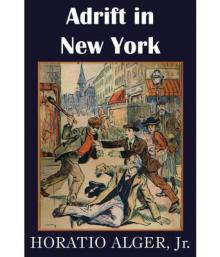 Adrift in New York: Tom and Florence Braving the World
Adrift in New York: Tom and Florence Braving the World Do and Dare — a Brave Boy's Fight for Fortune
Do and Dare — a Brave Boy's Fight for Fortune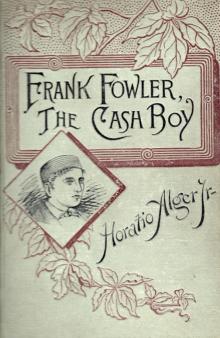 The Cash Boy
The Cash Boy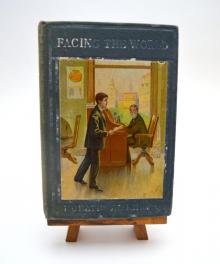 Facing the World
Facing the World The Young Explorer; Or, Claiming His Fortune
The Young Explorer; Or, Claiming His Fortune The Store Boy
The Store Boy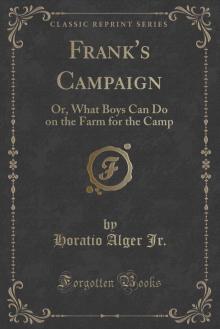 Frank's Campaign; Or, The Farm and the Camp
Frank's Campaign; Or, The Farm and the Camp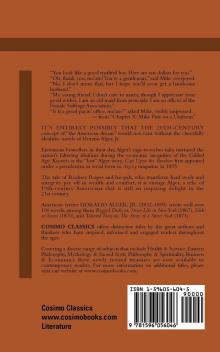 Cast Upon the Breakers
Cast Upon the Breakers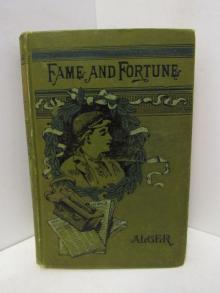 Fame and Fortune; or, The Progress of Richard Hunter
Fame and Fortune; or, The Progress of Richard Hunter The Errand Boy; Or, How Phil Brent Won Success
The Errand Boy; Or, How Phil Brent Won Success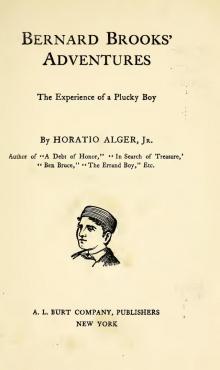 Bernard Brooks' Adventures: The Experience of a Plucky Boy
Bernard Brooks' Adventures: The Experience of a Plucky Boy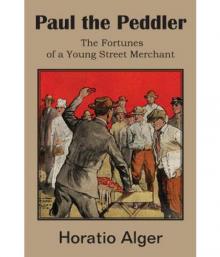 Paul the Peddler; Or, The Fortunes of a Young Street Merchant
Paul the Peddler; Or, The Fortunes of a Young Street Merchant Brave and Bold; Or, The Fortunes of Robert Rushton
Brave and Bold; Or, The Fortunes of Robert Rushton Try and Trust; Or, Abner Holden's Bound Boy
Try and Trust; Or, Abner Holden's Bound Boy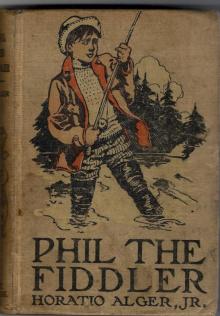 Phil, the Fiddler
Phil, the Fiddler In A New World; or, Among The Gold Fields Of Australia
In A New World; or, Among The Gold Fields Of Australia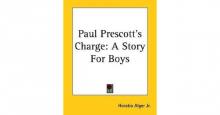 Paul Prescott's Charge
Paul Prescott's Charge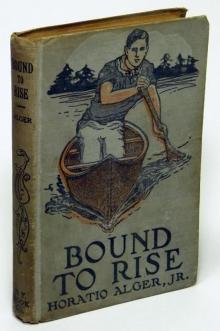 Joe's Luck; Or, Always Wide Awake
Joe's Luck; Or, Always Wide Awake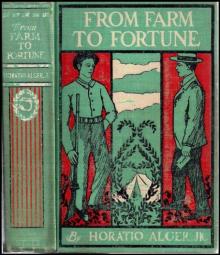 From Farm to Fortune; or, Nat Nason's Strange Experience
From Farm to Fortune; or, Nat Nason's Strange Experience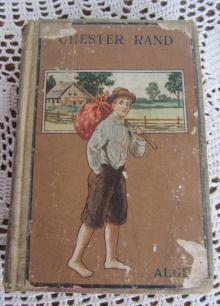 Chester Rand; or, The New Path to Fortune
Chester Rand; or, The New Path to Fortune Driven from Home; Or, Carl Crawford's Experience
Driven from Home; Or, Carl Crawford's Experience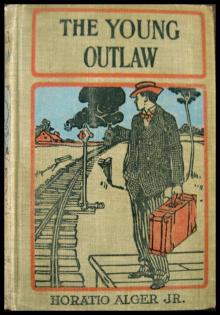 The Young Outlaw; or, Adrift in the Streets
The Young Outlaw; or, Adrift in the Streets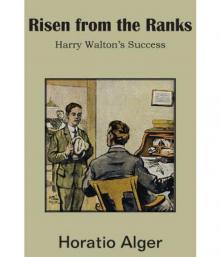 Risen from the Ranks; Or, Harry Walton's Success
Risen from the Ranks; Or, Harry Walton's Success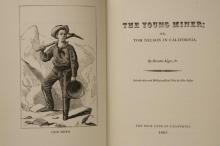 The Young Miner; Or, Tom Nelson in California
The Young Miner; Or, Tom Nelson in California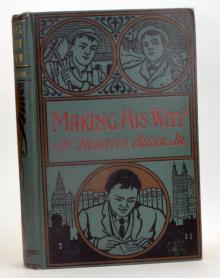 Making His Way; Or, Frank Courtney's Struggle Upward
Making His Way; Or, Frank Courtney's Struggle Upward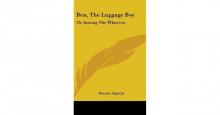 Ben, the Luggage Boy; Or, Among the Wharves
Ben, the Luggage Boy; Or, Among the Wharves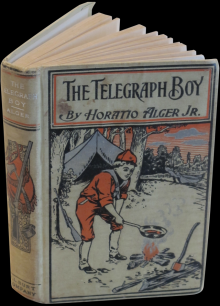 The Telegraph Boy
The Telegraph Boy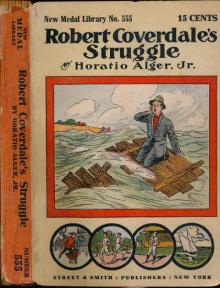 Robert Coverdale's Struggle; Or, on the Wave of Success
Robert Coverdale's Struggle; Or, on the Wave of Success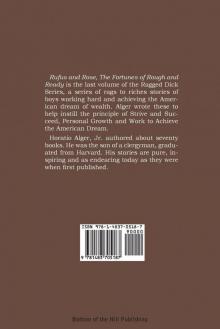 Rufus and Rose; Or, The Fortunes of Rough and Ready
Rufus and Rose; Or, The Fortunes of Rough and Ready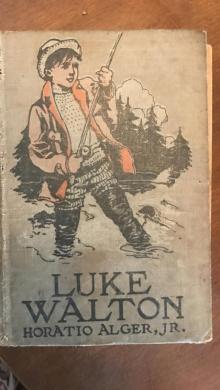 Luke Walton
Luke Walton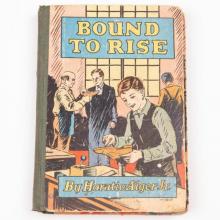 Mark Mason's Victory: The Trials and Triumphs of a Telegraph Boy
Mark Mason's Victory: The Trials and Triumphs of a Telegraph Boy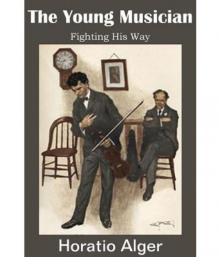 The Young Musician; Or, Fighting His Way
The Young Musician; Or, Fighting His Way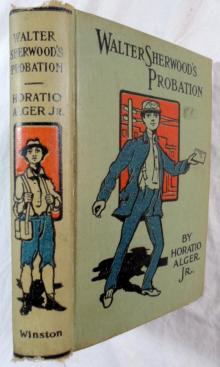 Walter Sherwood's Probation
Walter Sherwood's Probation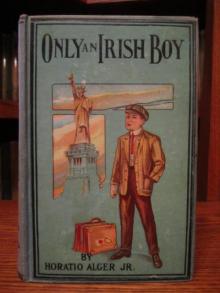 Only an Irish Boy; Or, Andy Burke's Fortunes
Only an Irish Boy; Or, Andy Burke's Fortunes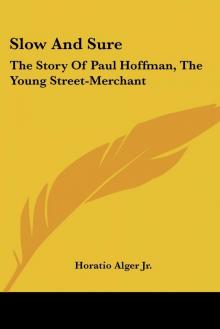 Slow and Sure: The Story of Paul Hoffman the Young Street-Merchant
Slow and Sure: The Story of Paul Hoffman the Young Street-Merchant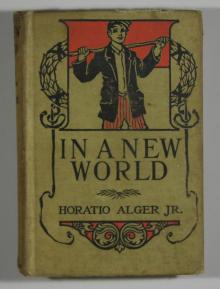 Herbert Carter's Legacy; Or, the Inventor's Son
Herbert Carter's Legacy; Or, the Inventor's Son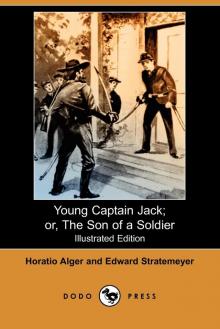 Young Captain Jack; Or, The Son of a Soldier
Young Captain Jack; Or, The Son of a Soldier Timothy Crump's Ward: A Story of American Life
Timothy Crump's Ward: A Story of American Life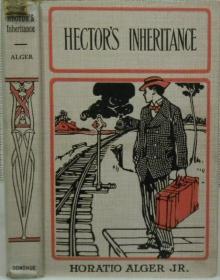 Hector's Inheritance, Or, the Boys of Smith Institute
Hector's Inheritance, Or, the Boys of Smith Institute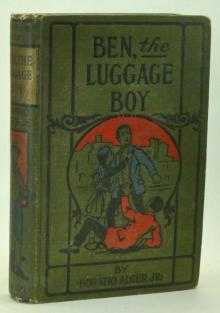 Ben's Nugget; Or, A Boy's Search For Fortune
Ben's Nugget; Or, A Boy's Search For Fortune